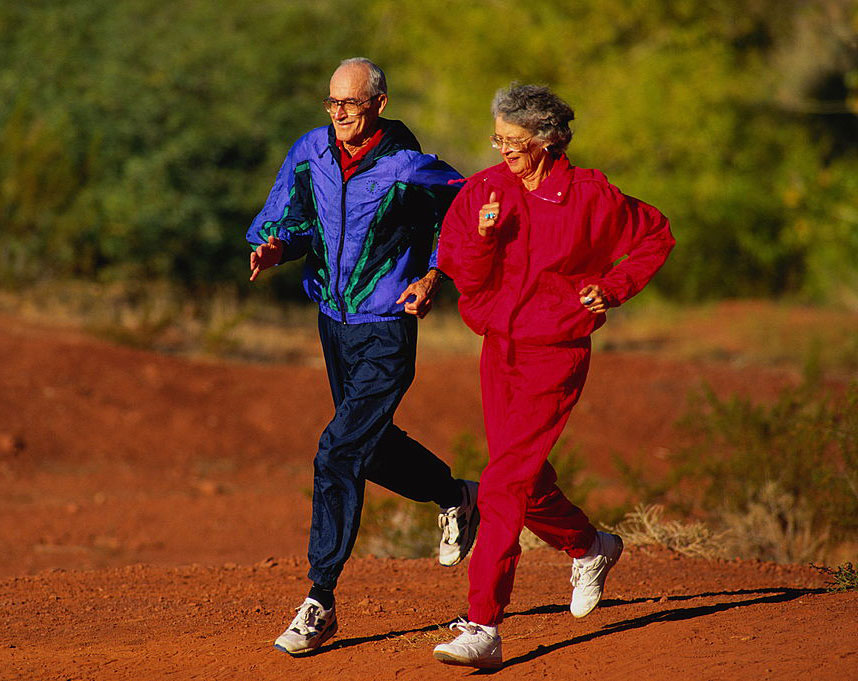Exercise for Seniors

Varied exercise can help you stay active and live longer.
Both aerobic exercise — and strength training — are good for everyone, and essential excersie for seniors, to minimize the risk of stroke, heart attack, depression, and falls.
Many older people cherish their morning walk or swim, and twice-weekly tennis game. By all means, keep up a routine that works for you. But it’s also a good idea to develop a second or third activity and build it into your life. A variety of exercise can add years to your lifespan, according to a 2016 study. When researchers recruited nearly 3,300 seniors between 1993 and 2001, and followed them for around 17 years, those who participated in more than one kind of physical activity lived longer.
YOU MIGHT ALSO LIKE: How to Eat Healthy as You Age
The American College of Sports Medicine and the American Heart Association recommend that seniors get at least a half hour of moderately intense aerobics five times a week, plus muscle-building and flexibility and balance exercises twice a week. Those guidelines also apply to people with chronic health issues beginning at the age of 50.
Look for activities that will get you outdoors in a green area: In one study, scientists compared the effect of a 50-minute walk along a multi-lane highway with the same walk through a leafy campus. The volunteers who had a dose of nature did much better on tests of attentiveness and mood (Are you surprised?).
You also want a menu of activities that will keep you active despite the weather. Don’t stop moving all summer if you live in Austin, Texas, or spend a northern winter on the couch. That’s where gyms come in. Consider martial arts or an active dance class. “The more activities you are open to, the less you will be limited by injury, weather, or access to equipment and the easier it will be to stay fit under any circumstances,” says exercise physiologist Phil Hardesty, who works with heart disease patients.
Many people fall off the exercise wagon when they develop a chronic problem that interferes with their routine. Be sure to ask your doctor of a physical therapist for ways you can keep moving. You might schedule a session with a trainer at the local gym — even if you haven’t been a regular gym-goer. A good trainer can run you through your options — biking or swimming, for example, if you have vulnerable knees. Again, if you already enjoy more than one activity, you’ll be better equipped to shift time towards the activity that best fits your current needs.
YOU MIGHT ALSO LIKE: Protecting Your Mobility in Old Age
You’ll hear that aerobic exercise will help keep you mentally sharp age you age. The science isn’t yet solid — the prestigious Cochrane group found insufficient evidence of measurable benefit to healthy adults. But it’s pretty clear that people with cognitive problems are less physical fit than others in their age group and that becoming fitter will enhance their quality of life.
If you’re worried about your memory, getting more exercise won’t hurt. You might feel sharper if it boosts your mood and becomes an opportunity to socialize. One small study recruited volunteers age 50 and up who complained of “memory problems” but did not meet the criteria for dementia. Half who become regular exercisers for six months after being sedentary boosted their scores on a dementia test — and the benefits lasted up to a year and a half later. Scores declined in a control group of people who didn’t exercise.
A fast way to assess your fitness: sit cross-legged and barefoot on the floor, and rise to stand without using a hand, knee, or anything else for balance. You get a perfect score of 10 if you stand up without help. If you need to use your hand you lose a point, and if you need your hand and your knee, you lose two. In a 2012 study of more than 2,000 adults ages 51 to 80, fewer than half scored above 7. Every extra point was linked with a 21 percent improvement in how long you’ll live. This makes sense if you realize that falls can be devastating for the elderly.
A strong hand-shake, narrow waist, and the ability to walk quickly are all signs of good health. It’s never too late to boost your fitness. Longevity experts look for the direction over time. Becoming more active is ideal, even if you can’t match your college sprint.
Updated:
April 07, 2020
Reviewed By:
Janet O’Dell, RN